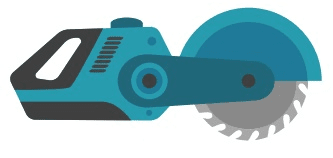Mitre Saw UK Explained In Fewer Than 140 Characters

A Comprehensive Guide to Mitre Saws in the UK
Mitre saws, also called chop saws, are important tools in the world of woodworking and construction. These makers are designed mostly for making precise crosscuts and mitre cuts in wood, plastic, and other materials. With numerous types and specs readily available, selecting the ideal mitre saw for your jobs can be intimidating. This guide intends to check out the information of mitre saws in the UK, highlighting their types, functions, advantages, and maintenance, in addition to a thorough FAQs area.
Comprehending Mitre Saws
Mitre saws have actually progressed into advanced power tools that feature numerous features tailored to different tasks. The basic operation of a mitre saw includes a blade installed on a swing arm that rotates to make angled cuts. Power Tools Online can be changed and locked to create precise mitres-- angles typically used in fitting frames, door trims, and more.
Kinds Of Mitre Saws
When considering acquiring a mitre saw, understanding the types offered is important. Below is a table summing up the various kinds of mitre saws typically discovered in the UK:
| Type of Mitre Saw | Description | Best For |
|---|---|---|
| Requirement Mitre Saw | Basic saw for crosscuts and mitre cuts. | Simple crosscuts in lumber. |
| Compound Mitre Saw | Can tilt to one side to create bevel cuts. | Crown moulding and complex angles. |
| Sliding Compound Mitre Saw | Functions a sliding arm for broader cuts. | Large boards or intricate joinery. |
| Digital Mitre Saw | Equipped with digital readouts for precise angles. | Advanced woodworking and accuracy-critical tasks. |
Secret Features to Consider
When selecting a mitre saw, several essential functions must be thought about. Here's a comprehensive list:
- Power: Look for mitre saws with a motor power ranking of a minimum of 1,500 watts for effective cutting.
- Blade Size: Common blade sizes vary from 10 to 12 inches, with bigger blades enabling deeper cuts.
- Cutting Capacity: Check the maximum width and depth of cuts to ensure viability for your projects.
- Angle Settings: An excellent mitre saw need to have both left and best angle settings for adaptability.
- Security Features: Look for features such as blade guards, electric brakes, and safety switches.
- Mobility: Consider whether you require a lightweight design for task website mobility or a much heavier design for fixed usage.
- Dust Collection: Efficient dust collection systems can assist maintain a tidy workplace.
Advantages of Using a Mitre Saw
Mitre saws are not just effective; they are versatile tools that use numerous advantages:
- Precision: Produces precise cuts for professional-quality results.
- Adaptability: Suitable for numerous materials, consisting of softwood, wood, and plastics.
- Reduce of Use: Designed for single-handed operation, making it easy for both beginners and experts.
- Speed: Cuts through products rapidly, saving valuable time on tasks.
Upkeep of Mitre Saws
Maintaining a mitre saw guarantees durability and constant efficiency. Key maintenance tasks include:
- Blade Care: Regularly inspect the blade for dullness or damage and replace it when needed.
- Cleaning: Clean the saw and its components to avoid dust build-up, which can impede performance.
- Lubrication: Lubricate moving parts, such as the pivot points, to guarantee smooth operation.
- Check Alignment: Periodically check the alignment of the saw to make sure accurate cuts.
Frequently Asked Questions (FAQs)
Q1: What is the difference between a compound mitre saw and a sliding compound mitre saw?
A compound mitre saw can make angled cuts (mitres) and bevel cuts (tilt modifications). On the other hand, a sliding compound mitre saw has the added ability of sliding on rails, permitting larger cuts.
Q2: Can mitre saws cut metal?
Some mitre saws can cut non-ferrous metals using the proper blade, but it is necessary to check the manufacturer's requirements before attempting such cuts.
Q3: How long can I expect a mitre saw to last?
With correct maintenance, a great quality mitre saw can last for many years. Frequently changing blades and keeping the saw clean are crucial for longevity.
Q4: Is it safe to use a mitre saw?
When utilized following security preventative measures-- such as using protective eyewear, utilizing clamps to protect the product, and guaranteeing the blade guard is in location-- mitre saws can be used securely.
Q5: Can I utilize a mitre saw for materials other than wood?
Yes, mitre saws can frequently cut through plastics, some composites, and non-ferrous metals, provided the right blade is fitted.
Popular Brands of Mitre Saws in the UK
The UK market is abundant with trustworthy brands providing a vast array of mitre saws. Below is a shortlist of popular brand names, known for their quality and durability:
| Brand | Attributes | Model Examples |
|---|---|---|
| DeWalt | Robust construction with high efficiency. | DeWalt DWS780, DWS774 |
| Bosch | Innovative functions and precision engineering. | Bosch GCM 800 SJ, GCM 12 GDL |
| Makita | Known for trustworthy efficiency and longevity. | Makita LS1219/2, LS1019L |
| Hitachi (now Metabo HPT) | High-quality and strong sawing capabilities. | Metabo HPT C3610DRA, C10FCH2 |
| Ryobi | Budget friendly options, great for DIY lovers. | Ryobi RWSL1801, RWSL2800 |
Mitre saws are necessary tools for any woodworking enthusiast or professional. Comprehending the different types, features, and upkeep requirements is essential in choosing the right saw for your needs. With the best understanding and devices, anyone can take on complex woodworking projects with precision and ease. Constantly keep in mind that safety ought to be a leading concern, guaranteeing that every cut is not just accurate but likewise safe.

